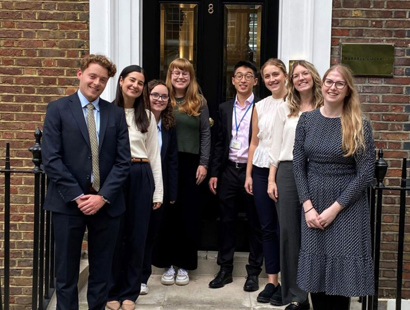
The one with the trainee and Ross from Friends
Almost five months have passed since I commenced my training contract in the family and children team in Bedford Row.
Joining the team allowed me to reflect on my prior understanding of family law, which as I came to realise, had been part influenced by a family elective during the LPC, and part influenced by the journey of Ross from Friends as he navigated through his three failed marriages.
Whilst my time studying the LPC is long behind me, Ross is very much a constant in my life. Watching repeat episodes of Friends, however, feels slightly more nuanced now that I’ve had five months of experience in one of Russell-Cooke’s three family and children law teams. My exposure to the varied workload that a trainee can expect from a seat in the family team has made me more alert to the practicalities that Ross may have had to consider as a party to divorce proceedings if, of course, his divorce was governed by English law.
So, how would the law apply if Ross were to instruct Russell-Cooke in relation to his divorce, and what work would I expect to carry out as a trainee brought onto the matter?
Ross and Carol's relationship
Ross is seeking a divorce from his wife, Carol, who he has been married to for approximately 10 years. Ross and Carol were both born in London, where they currently live with their three-year-old son, Ben. Their marriage has unfortunately broken down after Carol confessed that she had committed adultery and was leaving Ross for another woman.
Ross will have to prove that his marriage has irretrievably broken down by establishing one of five facts. Three of those facts depend on periods of separation of two years or more. Ross and Carol have not been separated for this period, so Ross will have to issue a petition on the basis of adultery or behaviour.
Ross emails my supervisor to say that he would like to issue the petition on the basis of adultery. My supervisor asks me to draft a reply to Ross and, before doing so, conduct some research to ascertain whether petitioning on the basis of adultery is possible. In my reply to Ross I explain that the statutory definition of adultery does not include same-sex intercourse and so, if Carol has committed adultery with another woman, he will not be able to use this as a reason for divorce.
Instead, Ross will have to show that Carol has behaved in such a manner that he finds it intolerable to live with her and that their marriage has therefore irretrievably broken down. I draft four or five examples of behaviour particulars which Ross may wish to rely on and send these onto him for review. Ross is content to proceed with the petition and once finalised, I serve it on the Court and Carol on his behalf. Carol acknowledges receipt of the petition and Ross instructs us to apply for Decree Nisi.
Over the next few months Ross and Carol work together constructively to agree upon the division of their assets and the living arrangements for their son, Ben. Once agreed, I work with my supervisor to draw up Ross and Carol’s financial settlement into a consent order and send this, along with a Child Arrangements Order, onto Ross for review. I lodge the finalised documents with the Court and, once approved, Ross instructs us to apply for Decree Absolute on his behalf. He is now legally divorced from Carol.
Ross and Emily's relationship
A year later and Ross is now seeking some advice in relation to his second wife, Emily. Ross unfortunately said another woman’s name at the altar when he and Emily married. The couple have since attempted to resolve their marital dispute, but to no avail. Ross and Emily have thus agreed to divorce.
I draft a letter to Ross in order to explain his position. English law permits divorce after a minimum of one year’s marriage and so, given Ross and Emily’s short marriage together, divorce is currently not an option. Ross could consider applying for an annulment, a declaration by the court that a marriage was legally invalid or had become legally invalid. The grounds for obtaining an annulment are, however, complex. With this in mind, obtaining an annulment is unlikely to be an easy feat and so the couple decide to remain separated and file for divorce once they’ve been married for 12 months.
To complicate matters further, Emily is a US citizen. This introduces a jurisdictional layer to the couple’s relationship and invites Emily to issue proceedings in the States. I draft a letter to Ross warning of the jurisdictional issues which may come to light if Emily decides to issue proceedings overseas first. I clarify that our advice is limited to English law and recommend that Ross take foreign legal advice should Emily issue proceedings overseas first.
Ross and Rachel's relationship
Now divorced from Emily, Ross reaches out to the firm once more. He has recently holidayed with his friends in Las Vegas where, after consuming a great deal of alcohol, he drunkenly married his friend, Rachel. Ross and Rachel would now like to end their marriage.
Provided the officials present at the wedding were qualified and all paperwork was complete, Ross and Rachel’s marriage would be recognised under English law. However, the couple have been married for less than a year and so divorce is currently not an option.
I draft an email to Ross advising him of his options. If Ross and Rachel can prove that they were so drunk that they did not consent to their marriage, or that they weren’t able to consent to their marriage, then they may be able to apply for an annulment. Ross and Rachel agree to proceed on this basis.
Conclusion
A six month seat in the family and children team unfortunately does not allow enough time to work with a client in respect of their three failed marriages. The issues raised above, however, hopefully provide a short anecdote of the wide-ranging types of work you can expect to have on your to-do list across a range of matters. The comprehensive workload and exposure to clients have certainly guaranteed both an interesting and rewarding day-to-day.
Get in touch
Visit our graduate recruitment portal for further information on our training contracts and vacation scheme.




